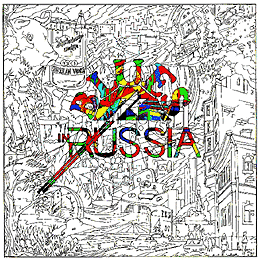
|

| 
| 
|
|
"CROSSROADS" from Moscow is a relatively new project of experienced
musicians under the leadership of Sergei Woronov - singer, guitarist, and
author of several blues hits. The band, whose name evokes the late, great
Robert Johnson, was one of a few of participants in the festival who could
be regarded as true professionals. Coincidentally, their song "Blues Lives
in Russia", written for their album, emerged as the theme song of the
event. Their music is modern, rhythmically-complex hard blues.
Igor Vdovchenko from Moscow, put together his band specially for the festival. His cohorts, Mike Ryzhenkov, who sings in the group "Carry Me", and Ivan Rayner, are veterans of the Estonian blues underground. Drummer (and shoemaker) Alexander Shakh is from Tblisi. Their blues friendship began years ago when they arranged country-blues jam sessions for friends in Moscow apartments and on the beaches of the Baltics. "BLUES STREET FRIENDS"(St.Petersburg). Terry - guitarist, poet, and composer - and four of her "blues street friends" used to perform regularly in underground passages from Moscow to the Baltics. With their "underground" past they share something in common with Igor Vdovchenko. They perform light, spiritual-blues. "Дождь"(Rain) from Kharkov and "BLUES OFFICE" from Ashgabat represented "youth" at the festival. Participants in the festival fell into two distinct groups - "masters" with ten to twenty years of experience, and "novices" averaging about twenty years of age. For a number of historical and political reasons there were practically no performers from the "middle period" between the two groups. The festival, however, bridged the generation gap. "Blues Office", somewhat of a "diamond in the rough", has a vital, raw strength and is clearly progressing toward a tighter sound. Their success at the festival was a victory for them, and offers us great hope for the future of blues in Russia. The "SATS BLUES BAND", together with "ULTIMA THULE" and "COMPROMISE BLUE", represented Estonian blues. The young collective of Andrey Sats and singer Andrus Albrekht find their roots in early psychedelic blues. The group assembled under Yaak Akhelik (CB), the only group in the event with a brass section, has a captivating melodic-blues sound. The aesthetically pleasing vocal-visual performance of Emil Ruttiku at the festival met with popular approval. The "SILVER ROUBLE" band from Moscow is the "Flying-Dutchman" of Moscow blues, unpredictably appearing and disappearing. One-time member of the group "Lucky Purchase", Alik Mikoyan, performs in the best tradition of a Chicago veteran, but he considers himself a "non-professional". Under his competent direction, and with support from Konstantine Nikolsky and bass guitarist Evgeny Marulis, the festival audience met "Silver Rouble's" pure blues with delirious ovations. "Старая Гвардия" (Old Guard) from Moscow is yet another group of self-proclaimed "non-professionals" consisting of "super-professionals". Alik Sikorsky, Misha "Petrovich" Sokolov, and Alesha Shachnev have solid credentials from "Atlants" and "Samotsvets". The seniority of these "Old Masters" was offset by nineteen-year-old Denis Mazhukov (clearly a son of the "Old Guard") who plays a mean honky-tonk piano. "VETO BANK" from Kaunas was a highlight of the festival due to the incredible vocals of Arina and the smooth mainstream instrumentals of the group. No one would have thought while listening to Arina at the festival that later she would win the grand prize in the pop music festival "Yurmala-92". "Удачное Приобретение" (Lucky Gain or Lucky Purchase) from Moscow performed a sort of electro-blues-rock. Aleksey "White" Belov was in excellent form, displaying his mastery on the guitar, and his capacity for untamed, poetic improvisation. At the festival Aleksey Bolshakov performed with "Lucky Purchase", and Nikolay Arutiunov who appeared on "Lucky Purchase's" "Rock-n-Roll Hoochie Koo", displayed his talents as Moscow's most magnificent blues vocalist. "Лига Блюза" (Blues League) from Moscow, in their thirteenth year of existence came out with their first LP, and will go down in history for having cut the first Russian rhythm-n-blues record. Their work combines blues classics, and original Russian blues. Their performance of several songs by Jimi Hendrix was a tribute to blues' rich musical heritage. The three-day "Blues in Russia" festival in January 1992 established two simple truths: first, that there is no shortage of talented blues performers in Russia, and second, that there is no shortage of blues fans. In troubled times blues can't fill your stomach, but it can provide sustenance for the mind and the soul. In America, blues and its musical offspring - jazz and rock-n-roll - helped break down the barriers between blacks and whites. The Russian blues brotherhood, although young, is beginning to thrive in a climate where traditional politics and traditional economics no longer count. In the hope that blues will become a permanent tradition in Russia, we'd like to say: "IT HEALED ME, IT CAN HEAL YOU" - JLH." Written by Andrey Evdokimov in 1992 |

|

| 
|
